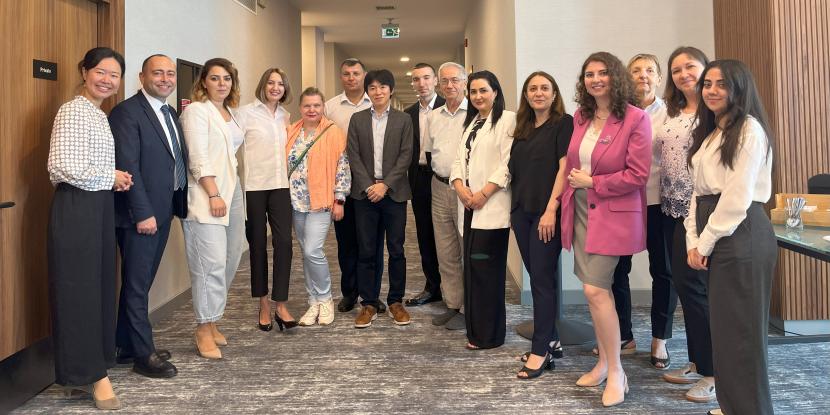July 30th, 2024, Baku, Azerbaijan: The main meeting of the Mutual Learning Programme (MLP) on enhanced reporting on mitigation actions and NDC tracking was organized by IGES and CBIT-GSP. More than 15 participants met in pe-person, and represented experts and practitioners from Azerbaijan, Georgia, Japan, Moldova and Uzbekistan. In 2024, the main learning sector was Agriculture. The countries were able to practice in filling in the CTF 5 table with policies and measures on emission reduction in Agriculture as well as pursue an exercise on describing methodologies and assumptions for these PaMs.
Key take-away messages:
- Agriculture is one of the main emitting sectors in all participating countries. In Agriculture, methane emissions are very high and there is a chance to use various mitigation measures and policies which help to reduce these emissions to achieve the global temperature goal.
- Although this year MLP, which was focused on Agriculture was quite a challenge (no disaggregated data, no access to internal status of agricultural policies and measures, etc) it was very useful for all participating countries to getting the feedback, clarification and common questions which helped to improving the quality of the reporting on NDC tracking.
- The countries are expected to include Exercise which they performed in MLP (i.e. CTF 5 for Energy and Agriculture, Methodologies and Assumptions for Energy/Agriculture) in their 1BTRs. Although coordination and communication with data providers in the Ministries and departments and private sector, is key to assure transparency and quality of information and reporting.
- In fact, 1BTR which is expected to be submitted by all participating MLP countries on time, before the end of 2024, will be used as the background and basis for NDC updating process. Whether the countries raise ambitions in their NDC-2025 will to the most extend on the information and results of their 1BTR in 2024.
- In-person meeting of MLP was more effective as claimed by participating countries, as it provided a possibility to go deeper into the country’s case and provoked wide discussion. It also gave an opportunity to be taught in practical way and to the way the participants will be transferring the acquired knowledge to other colleagues (i.e. a kind of ToT).
- Access to commonly shared folder to review and come back again to the exercises and estimates which countries have made is another point which was shared. Once the MLP is over the participants can always come back to the filled CTFs and Methodologies/Assumptions during the practical work under CTFs in 1BTR, which will encourage the countries to orient themselves in a right direction.
- Today’s biggest challenge for countries is the use of ETF reporting tool. It required more attention to use it effectively and timely.
-
Next directions for future collaboration can be: Consideration of other sectors for CTF 5 – LULUCF, IPPU and Waste, or filling in CTF3 (accounting approach in NDC).
Note:
MLP programme is funded by the Ministry of Environment of Japan, executed by IGES, MURC and the CBIT-GSP.
The main meeting was hosted by the Ministry of Ecology and Natural Resources of the Republic of Azerbaijan and supported by the Azerbaijan Branch of the Regional Environmental Centre for the Caucasus.
